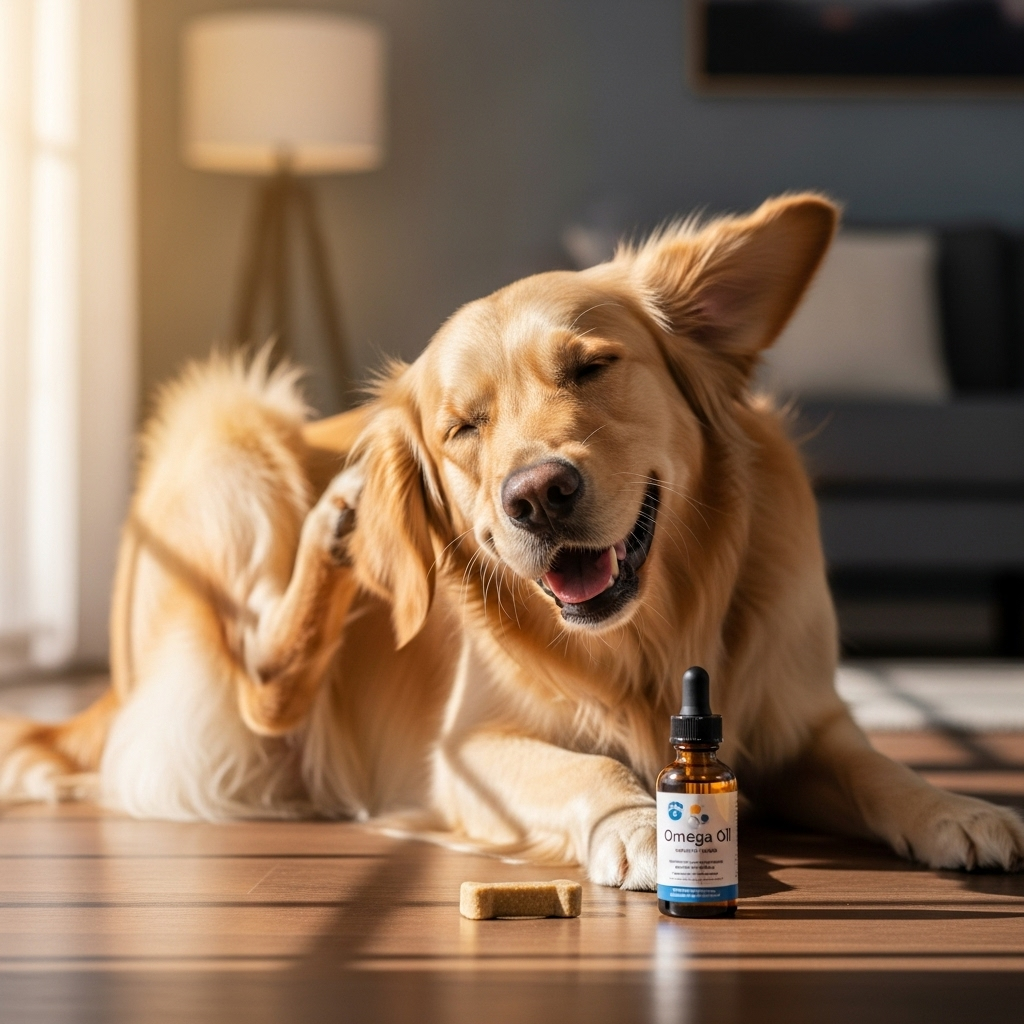Probiotics for Dogs With Itchy Skin & Seasonal Allergies

Many dog owners notice flare-ups of itchy skin, redness, licking or rubbing when pollen, dust, or other seasonal allergens are high. Alongside flea control, medicated shampoos and veterinary treatments, probiotics are increasingly recommended as part of a multi‑modal approach to support skin health and reduce allergy-related inflammation. This article explains how probiotics may help, what the evidence shows, how to choose and give them safely, and when to see your veterinarian.
How probiotics can help dogs with itchy skin and allergies
Probiotics are live microorganisms—typically bacteria or yeasts—that can benefit health when given in adequate amounts. For dogs with itchy skin and allergies, proposed benefits include:
- Modulating immune responses that drive allergic inflammation (supporting a more balanced Th1/Th2 response and promoting regulatory T cells).
- Improving gut barrier function and reducing systemic immune activation from intestinal permeability.
- Reducing markers of inflammation and supporting normal skin barrier function over time.
- Helping prevent or reduce antibiotic-associated diarrhea when antibiotics are used for secondary skin infections.
What the research says
Clinical research in dogs is growing but still limited. Small clinical trials and experimental studies have reported that certain probiotic strains can reduce severity of allergic dermatitis, decrease inflammatory cytokines, and improve some skin health measures. Results, however, vary by strain, dose, product quality and study design. Overall:
- Some strains—such as specific Lactobacillus, Bifidobacterium, and Enterococcus strains—have shown promise in canine trials.
- Effects are generally moderate and take weeks to months to appear; probiotics are not an immediate itch reliever like anti‑inflammatories or antihistamines.
- Probiotics are best viewed as an adjunct (supporting) therapy rather than a standalone cure for allergic skin disease.
Choosing the right probiotic for your dog
Strain matters
Different strains have different effects. Look for products that list the species and strain (for example, Lactobacillus rhamnosus GG or Enterococcus faecium SF68) rather than only the species. Products formulated and tested for dogs are preferable.
CFU and dosing
CFU (colony forming units) indicates the number of live organisms. Effective doses vary by product and dog size. Many veterinary probiotics range from 1 billion to 10+ billion CFU daily depending on the formulation and weight of the dog. Follow the manufacturer’s directions and your veterinarian’s advice.
Product quality and labeling
- Choose brands that guarantee CFU until expiration (not just at manufacture).
- Prefer products made for pets or backed by published trials.
- Consider storage requirements—some need refrigeration, others are shelf‑stable.
- Avoid unnecessary fillers, artificial additives, or products with high sugar content.
How to give probiotics
- Give with food unless the label says otherwise—food can buffer stomach acid and improve survival of probiotic organisms.
- Administer daily as directed. Allow at least 4–8 weeks to evaluate benefit for skin/allergy improvement.
- When using antibiotics, many veterinarians recommend spacing probiotics 2 hours apart from antibiotic doses. Some clinicians advise continuing probiotics during and after antibiotic therapy to help restore gut balance.
Safety and side effects
Probiotics are generally safe for healthy dogs. Possible side effects are usually mild and transient:
- Temporary gas, loose stools or constipation as the gut adjusts.
- Rarely, infections from probiotic organisms have occurred in severely immunocompromised or critically ill patients—discuss risks with your vet if your dog has a serious underlying illness.
Do not give live probiotics to dogs with uncontrolled systemic illness, severe immunosuppression, or invasive devices without veterinary approval. Always confirm product safety for puppies and pregnant dogs with your veterinarian.
When probiotics are most useful
Probiotics may be most helpful as part of a comprehensive allergy plan that includes:
- Accurate diagnosis (veterinary exam, allergy testing if indicated).
- Allergen avoidance where possible (bathing after outdoor exposure, keeping windows closed during high pollen, etc.).
- Topical therapies and medicated shampoos for immediate relief and to treat secondary infections.
- Veterinary-prescribed systemic treatments (antihistamines, steroids, immunotherapy) when required.
- Dietary management for suspected food allergies or to support skin barrier health.
Probiotics can complement these approaches by supporting gut‑immune interactions that may reduce the intensity of allergic responses over time.
Practical tips for owners
- Keep a symptom diary (scratching intensity, flare dates, diet, seasons) to help assess probiotic effect.
- Start one supplement at a time so you can identify changes or side effects.
- Store probiotics according to label instructions and check expiration dates.
- Ask your vet about combining probiotics with prebiotics (synbiotics) and which strains are a good fit for your dog.
| Pros | Cons |
|---|---|
|
|
FAQ
Q: How long before I see improvement in my dog’s itchy skin?
A: Expect to give a probiotic at least 4–8 weeks to evaluate effects on allergic symptoms. Some improvements may take longer. Use a symptom diary to track changes.
Q: Can probiotics replace allergy medications or immunotherapy?
A: No. Probiotics are an adjunctive therapy. They can support overall immune balance but are not a substitute for prescribed medications or allergen‑specific immunotherapy when those are needed.
Q: Are human probiotics okay for dogs?
A: Some human products contain strains that may be safe for dogs, but pet‑specific products are formulated for canine needs and have appropriate dosing. Check with your veterinarian before using human probiotics for your dog.
Q: My dog is on antibiotics—should I stop probiotics?
A: Usually you do not need to stop probiotics. Many vets recommend continuing them and spacing doses a couple of hours apart from antibiotics. Ask your veterinarian for guidance specific to the antibiotic and your dog.
Key Takeaways
- Probiotics may help dogs with itchy skin and seasonal allergies by supporting gut‑immune balance, but they are not a standalone cure.
- Strain selection, product quality and appropriate dosing matter—choose veterinary‑recommended products where possible.
- Allow 4–8 weeks to assess benefit and use probiotics as part of a multi‑modal allergy management plan.
- Probiotics are generally safe, but consult your veterinarian for immunocompromised dogs, puppies, or dogs with serious illnesses.
- If your dog has severe or worsening itching, skin infections, or systemic signs, seek veterinary attention promptly.
Disclaimer: This article is for informational purposes only and does not replace veterinary advice. Always consult your veterinarian before starting any new supplement, especially if your dog has underlying health conditions, is pregnant, nursing, a puppy, or is taking medications. Your veterinarian can recommend appropriate strains, doses and a comprehensive allergy treatment plan tailored to your dog.

Leave a Reply